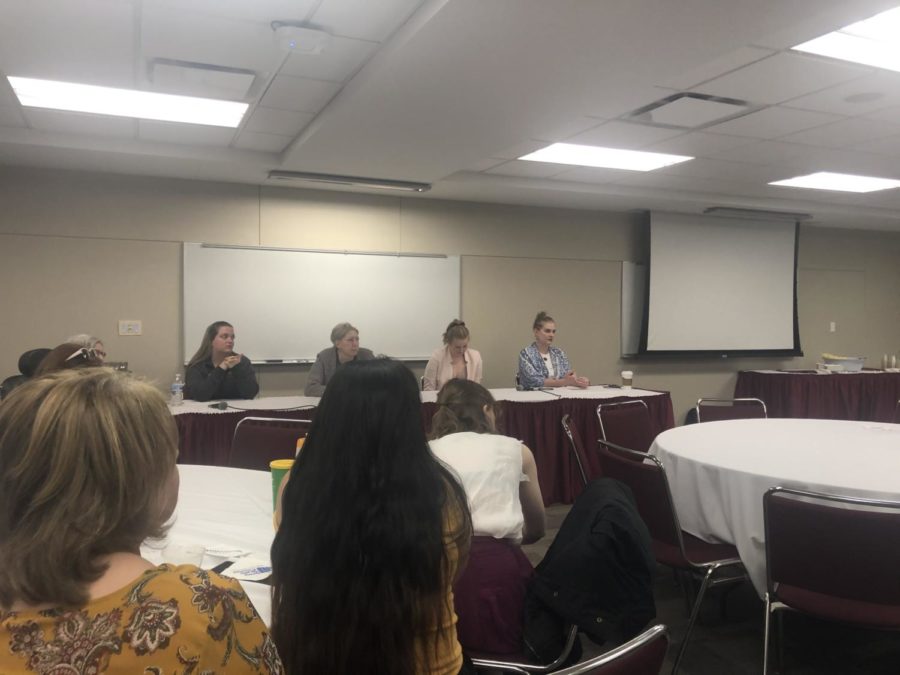Panel discusses relation of gender in sports and theater
The HERoic Symposium Roundtable “Diversifying the Wolfpack: Championing Gender Equity in the Arts and Athletics” included the following panelists: head cheer coach and Spirit Squad coordinator Kelli Baker, assistant teaching professor Tiffany Antone, ISU Theatre director Taylor Millar and former ISU Theatre member Jamie Steyer.
March 1, 2020
As part of ISU Theatre’s HERoic Season, a roundtable of panelists discussed issues related to gender and athletics.
Panelists discussed gender in athletics and theater at the HERoic Symposium Roundtable “Diversifying the Wolfpack: Championing Gender Equity in the Arts and Athletics” on Sunday in the Scheman building.
HERoic Symposium Roundtables are part of ISU Theatre’s year-long symposium series “HERoic: Gender Equity in the Arts,” which features women in theater.
The panelists included head cheer coach and Spirit Squad coordinator Kelli Baker, assistant teaching professor of music and theater Tiffany Antone, ISU Theatre director Taylor Millar and former ISU Theatre member Jamie Steyer.
Millar expressed a desire to see more gender equality in theater.
“About 10 percent of directors are women on Broadway, about 17 percent of choreographers on Broadway are female,” Millar said. “There’s an initiative called ‘50/50 in 2020’ that as part of our HERoic season we are a part of, to make 50 percent of the jobs in theater owned by women in 2020. I don’t know that we’re there in 2019 […] I am definitely ready to see more things.”
Baker said there is a need for a shift in the way our culture views women’s sports.
“In our bubble of college cheerleading we’re very inclusive,” Baker said. “But then there’s all these stigmas outside of that, for cheerleading especially. If you’re a male in cheerleading, you’re gay, if you’re a female, you’re popular […] I think the perfect answer is that there’s a cultural shift that happens somewhere along the lines, women’s sports get more supported, get more viewed, have more fans, make more money […] when there is that cultural shift, then it can change some of those things naturally, but that’s not necessarily going to happen until we get those things in front of people more.”
The panel discussed “The Wolves” by Sarah DeLappe, a play that ISU Theatre is putting on between last Friday and this upcoming Saturday.
“The Wolves” brings women’s sports and women in theater together. The play is put on by a female cast and is about a women’s soccer team.
“From the safety of their warm up circle an all-girls soccer team navigates the big questions and wages tiny battles with all the vim and vigor of a pack of adolescent warriors,” according to the ISU Theatre website.
Antone said the play’s representation of females is important.
“I think why this play was such a fresh voice [is because of] the play itself being so unique that we have an all-female soccer team on stage,” Antone said.
Steyer said she appreciated the crossover of women in sports and theater.
“I don’t think I’ve ever felt as seen by a production as this one, because as someone who was so deeply imbedded in athletics, but also so passionate, so involved in theater, there’s not a lot of crossover,” Steyer said. “Having those two worlds come together and be portrayed so beautifully was such a unique experience […] it absolutely felt so real, and so relatable.”
In 2019 and 2020, ISU Theatre has been producing HERoic, a season of plays and musicals written by women in celebration of the women’s suffrage centennial and a new commitment to the 50/50 by 2020 initiative promoting gender equity in the theater.
The symposium series has brought to campus guest artists and speakers who collaborate with faculty, staff and students on productions and engage the campus and local community on issues of gender parity and representation through a series of keynote lectures, panel discussions and master classes.

















